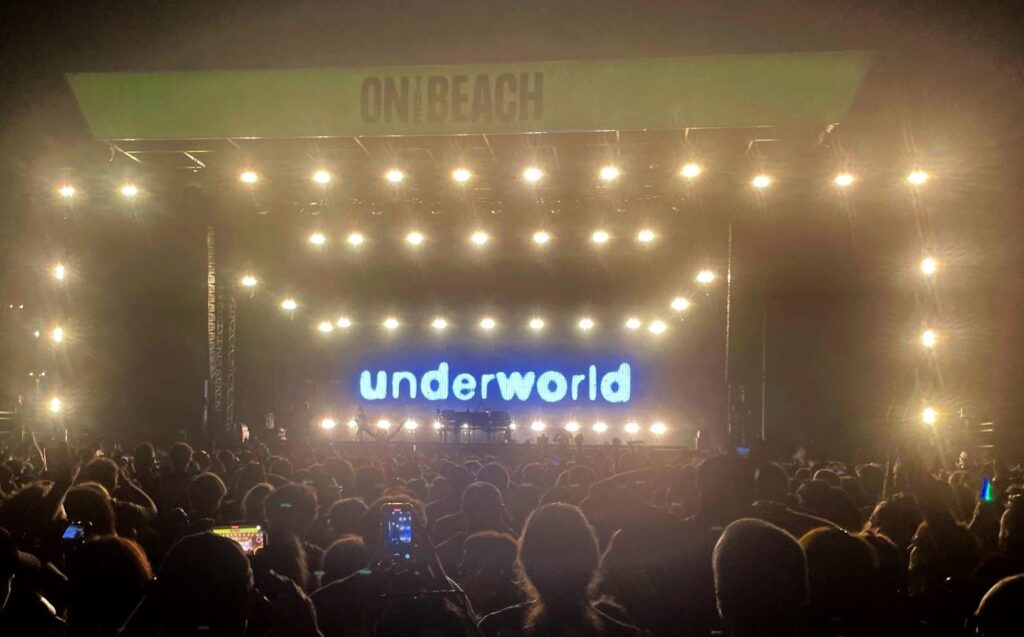Your basket is currently empty!
Underworld Still Carrying The Flag – Forty Years After Pivotal Change In Times
It’s sometimes wondrous how trains of thought can race away and spiral into a world of attachments from one idea or memory.
On Saturday, I was fortunate to enjoy seeing one of my biggest musical influences and one of my favourite electronic bands, Underworld – playing at Brighton Beach, near my new home.
For background purposes, one half of the band is Rick Smith from Ammanford, who was also pivotal in composing the score for the opening and closing ceremonies at the 2012 London Olympic Games, as well as numerous soundtracks and film scores.
The band formed after meeting as students in Cardiff in the early eighties and have been one of the most successful and groundbreaking electronic acts, since their third genre-shifting album; “Dubnobasswithmyheadman” – was released thirty years ago at a time of fresh musical wealth and diversity.
Smith has been one of Wales’s pioneering exports in the ever-evolving; now technologically-dominant music universe.

Meanwhile, the source of this speeding and spiralling thought occurred on Saturday afternoon, after a conversation I had with a friend among the beach pebbles, facing the stage; which began with the idea that “Kids nowadays have no idea about bands or DJs from our younger days”.
My friend had mentioned that his younger work colleagues had not heard of Underworld, nor in fact – the other performing acts which we middle-aged ravers flocked to enjoy on that day.
This made me realise how different things were for us, growing up in insular Llanelli in the days before the information superhighway and streaming revolutionised the world.
With only four television channels to watch and around six or seven radio stations into which we could tune – physical music was vital.
We absolutely had to learn, enjoy – even rebel from our parents’ musical collections in those days of heavy hardware, seven or twelve-inch records or cassettes; thus we certainly knew about the legacies of bands and singers from the 1950s and 60s.
At around the same time in the early eighties, little did the world know that two elements leaving Llanelli – would have uncanny lasting impacts in polar ways.
Rick Smith worked at a bank in Llanelli, then left the position to undertake an electrical engineering degree in Cardiff.
He met his future long-term musical partner, Karl Hyde there and they had already formed a band, Freur; within a short time.
Concurrently, in late 1980 Llanelli lost what must now be seen as a giant void; as its influential music venue, The Glen Ballroom closed its doors as a performance arena for the last time.
Since opening in 1964, the the depth of rock folklore displayed bands such as The Who and The Kinks, the cultural diversity of Desmond Dekker and The Aces, the feminine touch of Dusty Springfield and the superstar status of Tom Jones. Fleetwood Mac, Madness, Judas Priest and Slade all played at the venue more than once.
John Peel even compered a John Mayall (sadly passed this week) show at “The Glen”, as it was known in December 1968.

It was renowned for its revolving stage – so much so that on Tuesday 9th of February, 1965; The Zombies were booked to play after Tom Jones.
Yet, as lead singer Colin Blunstone remarked; “Obviously Tom was headlining but as it was a late gig, he didn’t want to finish the show.
So we had to follow him and as we warily stepped onto a revolving stage ready to be transported onto a stage facing an absolutely packed house of devoted Tom Jones fans, we slowly realised everyone had gone home leaving us to play our whole set to two people and a big black dog, and I’m pretty sure the dog didn’t pay!”
Imagining someone of Tom Jones’s stature, firstly performing in Llanelli is staggering – but also on a Tuesday night, particularly in February nowadays – is as surreal as would be almost fictitious.
What replaced the Glen Ballroom was then-recently crowned snooker world champion, local sportsman Terry Griffiths’ Matchroom; a dimly-lit hall for budding snooker enthusiasts.
The characteristic silence of snooker was deafening after sixteen years of live music – the vibrancy of that era never returned to that particular corner of town.
For those of us who were too young to visit the venue in its periodic glory, its legacy was never awarded posthumous celebration, nor was replaced, like-for-like.
On other strips of Llanelli in years to come – I became part of what Rick Smith had been starting to musically build with Underworld’s techno-indie sound, but from his new home – by then in Romford.
Nightclubs such as Moonraker and Bailey’s became the new temporary regime, with DJs taking more of a prime role in the town’s nightlife – I first performed at both in early 1998, then following Smith’s lead into both living – and playing electronic music as a DJ in Cardiff, London and elsewhere.
Yet, what had begun in those early nineteen-eighties days with the industrial deconstruction of Llanelli and much of South Wales, with the closure of steel and electrical plants, alongside rapid disappearance of coal mines in surrounding valleys – has echoed recently with the gradual decline of nightlife and live music.
Nowadays, the trend of international musical icons appearing in smaller towns relies upon a local sports stadium, beach-based or rural festival being held nearby – the cultural value of smaller community concert halls such as Glen Ballroom bringing legends to a close-knit town has; over the years gone hand-in-hand with its own local workforce joining the perpetual exodus to larger cities.
Underworld proved on Saturday that two men in their mid-to-late sixties can still wow audiences – and that kids should know about what came before their generations.
Speaking personally, Rick Smith has always retained a place as one of my “greatest living Welsh people” since I became part of that exodus thirty years ago, discovering their sound.
Kids would undoubtedly benefit from knowing about him.
Share us your thoughts on [email protected]
THERE’S MORE!
Owain Glyndŵr: A Welsh Rebel Who Challenged English Rule
The Unique Origins of Cremation in Cymru
The Tragic End of Cymru’s Last Native Princes
This Clever Trick Welsh Women Used to Defeat the French in 1797 Will Amaze You
More from Welsh Histories
Welsh Histories is a Welsh history celebrating platform which looks to promote all aspects of Welsh history. Though we focus predominantly on native Welsh history, we do also share the non-native aspects from time to time. You can follow us on Facebook; Instagram or Twitter for more. A reader? We also have our very own Welsh Histories Shop where we sell our Welsh Histories Magazine. Diolch yn fawr iawn and keep enjoying Welsh Histories.
Nathan Jones is a much-travelled Welsh exile, having grown up in Llanelli, South Wales and studied at Nottingham Trent University and Cardiff Metropolitan University. Having worked for many years in hospitality, education and production; Nathan has a career in DJing and radio presenting, over the past twenty-six years. He has written for online music magazines and websites, as well as his own poetry and lives in Brighton and Hove.



